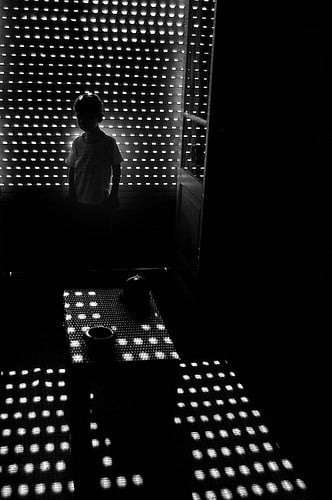“It’s locked,” Pen says, “because it’s dangerous. This instrument is deadly dangerous.” Certainly, Dance thinks, Pen looks nervous. “Often–” and he sees it again, a cloudiness, evidence of a secret,in Pen’s face–it’s like finding a secret door where you don’t expect one. Even if the door is locked, Dance thinks, you’re halfway there, because you know that nice, sturdy wall is a sham.
Dance shifts up onto one elbow, pulling himself forward out of Drin’s lap, shifting his weight around on the floor.
Pen starts again. “Often we were obliged to sandwich programming down inside very ordinary cognitive functioning. What we learned–” again, the eyes flash to Dance–“is that music was the best delivery system for the programming. It gets down below the consciousness structures; you can pattern with it, you can even change tissue–”
Change tissue. Dance looks at the coiling, color-changing mass of himself on the floor. Looks at his hands. Shivers.
“Each programmer–well, odd birds, you know, maths and music, you needed them both. Some brilliant composers–” and Pen nods to Barret, and for a second Dance feels something else, something less guarded–“not a drop of the right background in maths.”
“‘S true,” Barret says, reflectively, “I am not a math dude. I don’t even carry cash. And I’m a Mac user. I do all my sample editing visually, and then use my ears to tweak it.” He shrugs.
“Right,” says Pen. “Right. There were not so many. There were very few. We weren’t really composers. Maybe you could call us failures.” The word is harsh, and seems to strike Dance between the collarbones. “We were…not made right, I fear, we programmers.
“Be that as it may, you can identify our handiwork. Lord, you can! Even today. And by all rights I should be able to tell you the name of the poor bastard who gave you your skin, lad. But I can’t. I lost my memories in the Cell. Some of us loved Hindemith; one loved Brian Eno; a goodly number of us loved the Baroque composers, and one of the only bits I’ve got straight in my head–”
There’s a lull in the storm. The room has hushed, attention from all corners fastened on the voice and its unplaceable accent.
“We had a loyalist contingent. Mad for the Baroque, just mad for it, and how they’d go on in the commissary, about the storage capacities. What could we do?”
And he’s turned around to face Dance. He’s furious. He’s furious, Dance thinks, with me.
“What could we do about it? We told stories. We made games. We made you.”
Drin, at this, gets to his feet.
“Howell,” he says.
Pen’s face darkens.
“Howell,” Drin says again, softer this time, “please. Please help us. Then we’ll go. As soon as the storm lets up we’ll go. You won’t–you won’t see us again. Barret might need–”
“For God’s sake,” Pen says. “For God’s sake, you’ve no idea, not a single idea, what you’ve brought into my house.” And he looks at Dance. “You’ve brought this to me and asked me to help you finish it. All right. Let’s finish it.
“The last wave of Deltas were all musicians. Had to be. You needed–you didn’t so much need the music as the propensity to music, sets up the brain, certain basics very strong. Not all the Deltas were players, but they were musicians all, and if you are wondering if I remember you, I do. I remember you. I remember it went hard, with you.”
There is a ragged sound, Drin’s breathing, and behind that, almost lost in the rattle and wind, Emma’s voice, almost a sob.
“Hard with him how?”
“M’dear,” Pen answers lightly, “better not to ask.”
“Hard with him,” Emma says, rising, “how?”
Dance can’t get up off the floor, not yet. His tail moves. The tip of it rises, lightly touching Emma’s hand. “Let’s finish it,” he whispers.
“Right, m’dear,” says Pen. “We’re almost there. Almost there now.
“Eventually we learned to key the instruments. Even when the Deltas were not players, they needed the instruments to–to scare all that information awake. This one–well, this one’s for you. It will kit you out with the rest of you. S’all in there, in your bonnet,” and he waves his hand, “the whole business. Locked into your genetic structure, neat as you please, no piggybacking, no bioalloy data carriers, oh no, thoroughly organic. That’s what made the Deltas special, what made them nice.
“But you had to be careful. You put the stuff in the song, then you put the song with the sound, that’s the two-part lock, and we used those, too, in those dangerous days. We tried, at first, pure sound waves–” he gestures at the keyboard sitting on the blanket beside Barret, “the funniest thing–it wanted strings. Strings. Any would do, as long as they vibrated. Cannot program a modified person with a harmonica, and you can bet your skin they tried. Budgetary constraints.”
Drin makes a sound, then, a rumble in his throat, which is abruptly echoed by a low boom that makes the panes rattle in the window.
“It’s getting rough again– we can be up here, right?” Barret says then, watching the window.
“Sure,” Pen says, sounding suddenly remote.
“You’re saying,” Dance says then, “that this viola comes from before.”
“It does,” Pen replies, quietly. “It’s been waiting for you, all this time.”
He smiles. The smile is just a fraction too bright.
